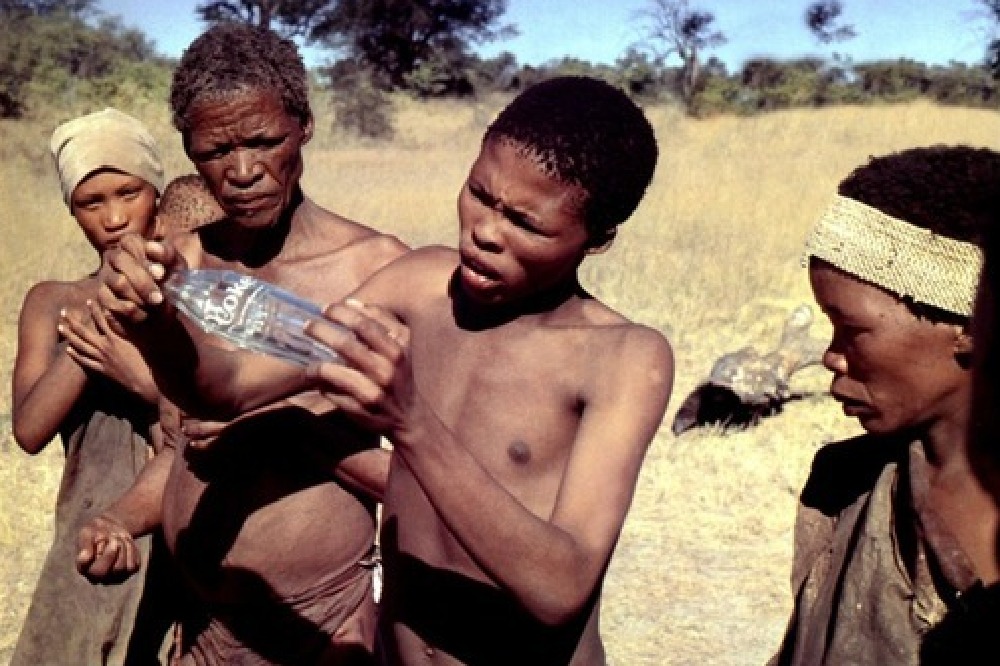
The Gods Must Be Crazy
Separated by six hundred miles and tens of thousands of years of cultural and scientific development, live two acutely different peoples. The little people of the Kalahari desert adapt themselves to their natural environment and its seasonal rhythms. The civilized people of South Africa adapt to an environment designed by man to make life more pleasant.
In the desert community, the Bushmen awaken with the sun to collect water from drops of dew that have formed on large leaves. These hunter/gathers track animals and collect foodstuffs to share with the family. The children learn survival skills at their parent’s side. It’s a slow-paced life without calendars or clocks.
In the civilized community, the city dwellers divide their day into sections with the help of man-made devises. Their work day requires a hierarchy whereby leaders authoritatively prescribe what others must do. By following instructions, citizens earn currency to purchase food and labor-saving devices. Their children sit indoors for hours every day and learn from lectures and books. It’s a fast-paced life with cars and time clocks.
These two worlds collide when a glass bottle falls from high in the sky to the sandy desert below. Xi (N!xau ) picks up this strange and beautiful thing and introduces it to his family. Everyone finds a different use for this magical thing, and soon everyone needs this labor-saving devise. But the gods have sent only one.
New emotions emerge. Impatience at having to wait for the thing turns to jealousy and anger. The bottle is used to strike another. Blood is shed.
Xi decides that the gods have made a mistake. They have sent an evil thing. He tells the family that he will walk to the end of the earth and throw it away.
Meanwhile, two thousand miles to the north, a rebel gang wielding automatic guns makes a strike on a government meeting and kills three cabinet members. With camouflage clothing, jeeps, tanks, a helicopter, and a bazooka, the violence escalates.
One of man’s most attractive traits is his ability to laugh, to be amused by unexpected or unusual behavior. Slapstick, a theatrical devise that uses exaggerated behavior in order to amuse has been a part of theater performances for hundreds of years. It was popular during the vaudeville era and in the silent movies. The Gods Must Be Crazy uses a subtle form of slapstick in two ways.
The significance of the violence in the rebel scenes is undeniable, but with the effective use of slapstick the viewer is prevented from becoming sidetracked by negative emotions. Being conked on the head by a flying object, slipping on bananas, and having the cartridge of a bazooka fall repeatedly out of its barrel keeps the tone of the movie light and entertaining. Sam Boga, the rebel leader, plays the straight man, reminding us that this gang is up to no good.
In South Africa, Kate Thompson (Sandra Prinsloo), a stressed writer, decides to take a break from her civilized life. She answers an ad to teach school at a mission located at the desert’s edge. The reverend asks Andrew Steyn (Marius Weyers ), a sweet, amiable biologist working on his doctoral thesis, to pick up the new school teacher at the bus stop.
Andrew’s truck has a temperamental engine and no brakes, which presents a problem at border gates. But with amusingly clever solutions he reaches his destination, collects Kate, and begins the journey to the village. Inevitably, the truck leaves them stranded overnight in the bush.
The second use of slapstick in this movie is Andrew’s klutzy missteps. It keeps the couple separated while the romantic tension builds. Being shy and awkward around women, Andrew’s blundering behavior, facilitated by warthogs and rhinoceroses, causes Kate to mistrust Andrew. While Kate plays the straight woman here, we viewers find Andrew’s behavior endearing. The use of the truck as a prop to his goofiness is brilliant.
The next morning Andrew’s helper, Mputi (Michael Thys), rescues them. While Andrew and Mputi discuss the truck now hanging high from a tree, Xi walks up.
The discussion turns to the evil thing. These creatures, whom Xi initially mistakes for gods, don’t want the thing and refuse to take it back. The four resume their assigned duties: Xi to trek to the end of the earth, Kate to accept her teaching assignment, Mputi to repair the truck, and Andrew to gather and analyze elephant dung.
Unaware of civilized man’s ownership laws, Xi is arrested when he kills a goat at mealtime. Lacking the flexibility to consider cultural differences, the judge fails to recognize Xi’s innocence of intentional thievery. Xi is sentenced to three months in jail. Unaccustomed to walls, this gentle and friendly man becomes despondent and is unable to eat.
A week later, Andrew and Mputi hire Xi as an ecological expert on the work release program. They are warned that Xi has no experience and no qualifications. Rather, with nimble quickness and expert tracking skills, Xi unselfishly risks his life to deliver these people, whom he once thought were gods, from a charging lion and kidnapping rebels.
The God Must Be Crazy is a lighthearted adventure tale that pokes fun at civilized man. Should we begin to ponder its underlying messages, it may lead us to question the necessity of our possessions, the logic of our rituals, and the sanity of our culture.
The Gods Must Be Crazy was written and directed by Jamie Uys, who also played the reverend. This funny and poignant movie is one that classic movie fans will return to often.

